
For one hundred years, the Brookings Institution has been a leader in generating ideas to address pressing national and global challenges. As we enter our second century, we look back at key milestones of our first.
1916
The Founding Moment
institutional milestone
A group of leading educators, businessmen, attorneys, and financiers—including businessman and
philanthropist Robert S. Brookings—found the Institute for Government Research (IGR), the predecessor of the
Brookings Institution, in Washington, DC. It is the first private organization devoted to bettering the practices
and performance of government with recommendations generated by outside experts. Its first research project,
directed by economist William Willoughby, focuses on helping the Bureau of Internal Revenue revise the reporting of
tax statistics for greater accuracy.

Robert Somers Brookings
Brookings
Brookings
1917
President Wilson Appoints Mr. Brookings to War Board
President Woodrow Wilson appoints Robert Brookings to the War
Industries Board, which coordinates the purchase of
military supplies, and later makes him chairman of the
board’s Price Fixing Committee,
to discourage profiteering.

Robert Brookings (center, seated) and the Price Fixing
Committee
Brookings
Brookings
1919
Toward a National Budget System
IGR publishes “A National Budget System: the Most Important
of all Governmental Reconstruction Measures.” The Institute’s director, William Willoughby,
testifies on the subject to a House Select Committee on the Budget.
1921
The Greatest Reform
landmark research
IGR recommendations lead to the crafting and passage of the
Budget and Accounting Act of 1921, which expands executive
power in the federal budget process. President Warren Harding
calls it “the beginning of the greatest reform in
governmental practices since the beginning
of the republic.”

GAO desks in Great Hall of the Pension
Building
“Defender of the Public Interest: The General Accounting Office, 1921-1966,” by Robert Trask, GAO
“Defender of the Public Interest: The General Accounting Office, 1921-1966,” by Robert Trask, GAO
1922
Robert Brookings Creates the Institute of Economics
Robert Brookings leads the creation of a new organization,
the Institute of Economics, for the “sole purpose of
ascertaining the facts about current economic problems and
of interpreting these facts for the people of the United
States.” Harold Moulton, an economist at the University of
Chicago, is named its director.
1923
Studies in Post-War Reparations
Harold Moulton and staff economist Constantine McGuire
write of post-Great War Europe that “the reparation
situation has gone from very bad to worse.” In their
reports they study the ability of Germany and its allies
on the losing side of World War I to pay the debts mandated
by the Versailles Treaty.

U.S. political cartoon depicting German reparations
sum
alphahistory.com
alphahistory.com
A Graduate School Is Created
The Robert S. Brookings Institute of Economics and
Government for Teaching and Research (later the Robert S.
Brookings Graduate School of Economics and Government) is
established in partnership with Washington University in
St. Louis to provide training in public service. Between 1924 and 1930, the school awards 74
PhDs.
1927
Three Organizations Merge into One
institutional milestone
The Institute for Government Research (founded 1916), the
Institute of Economics (1922), and the Robert Brookings
Graduate School of Economics and Government (1923) merge to
form The Brookings Institution, named for Robert Brookings
in recognition of his services to all three organizations.
Its mission: “to promote, carry on, conduct and foster
scientific research, education, training and publication in
the broad fields of economics, government administration
and the political and social sciences generally.”
First President Is Chosen
The Brookings Trustees choose the organization’s first
president: Harold Moulton, who had been director of the Institute of Economics and a member of
the boards of the Graduate School and the Institute for Government Research.
1928
Survey of American Indian Conditions
landmark research
Secretary of the Interior Hubert Work commissioned
IGR’s Lewis Meriam to undertake a comprehensive survey of
the condition of Native Americans. The resulting report is influential in
shaping American Indian affairs policies in the Hoover
and Roosevelt administrations.
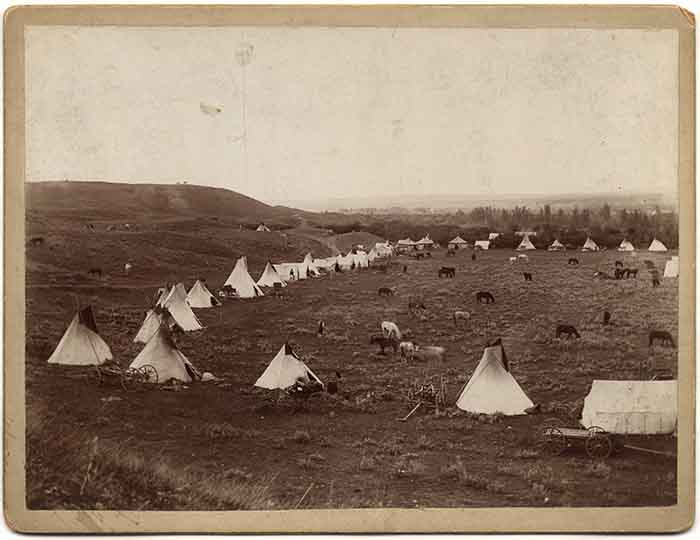
Photo from Indian Survey Trip, 1926-27
Brookings
Brookings
institutional milestone
Brookings begins its own in-house publishing division, the
forerunner of the Brookings Institution Press.
1932
The Founder Dies
Robert Brookings dies in Washington, D.C. on November 15,
at the age of 82. Just before his death,
Brookings’s book The Way Forward, in which he
calls for the more equal distribution of wealth, is published.

Condolence letter from President Roosevelt, November
27, 1932
Brookings
Brookings
1934
The Pioneering Capacity Studies
landmark research
The Institution publishes four works known as the “capacity
studies” on income distribution and economic progress in
the mid-1930s. The studies focus on production and
consumption capacity, capital, and market speculation in
the 1920s, and income distribution as it relates to the
efficient functioning of the
U.S. economic system. The capacity studies are the major guide to the U.S. economy for
policymakers for much of the decade.
1935
Analyzing New Deal Programs
An Institute of Economics team directed by staff economist Leverett Lyon publishes a
comprehensive study of President Franklin Roosevelt’s National Recovery Administration (NRA), a New Deal agency. The
study’s authors conclude that the NRA impeded economy recovery after the Depression. Two years later, Edwin Nourse,
an agriculture economist and director of the Institute of Economics, publishes a study of administrative problems in
the Agricultural Adjustment Administration. Agriculture Secretary Henry Wallace said that “We’ve been doing so much
wishful thinking around here, we’d benefit from an independent audit.” Nourse went on to become the first chairman
of the Council of Economic Advisors under President Harry Truman.

National Recovery Administration poster,
1934
Franklin D. Roosevelt Library
Franklin D. Roosevelt Library
1939
New Focus on Executive Office Organization
In “Reorganization of the national government: What does it involve?” Brookings scholars shed
light on President Roosevelt’s Reorganization Act of 1939, which permitted the president to reorganize certain
aspects of the executive branch and created the Executive Office of the President.
Supporting the War Effort
Throughout World War II, Brookings experts recommend policies on
a variety of issues, including wartime price controls, military mobilization, German and U.S.
manpower requirements, and later, postwar demobilization and preventing Germany and Japan from re-arming. Even
before U.S. entry into the war, one Brookings researcher advised that “The United States should introduce the
formula of the blitzkrieg in the armament production program” to defeat Germany.

B-24 Liberator bombers at Michigan’s Willow Run
Factory, ca. 1941-45
Wikimedia Commons
Wikimedia Commons
1941
Congressional Apportionment
A study by Brookings scholar Laurence Schmeckebier developed the system of apportioning
congressional representation among the states that was embodied in the Congressional Apportionment Act of 1941.
1946
Foreign Policy Group Created
institutional milestone
After returning to Brookings from a nine-year stint at the State Department, during which he
prepared the final draft of the UN Charter, economist Leo Pasvolsky establishes and becomes first director of the
International Studies Group at Brookings. ISG fulfills the need for research and education in international
relations and is the precursor to what will become the Foreign Policy program at Brookings. For six years until his
death in 1953, Pasvolsky and the ISG conduct educational programs for academic, military, government, and business
leaders.
1947
Studying a National Health Insurance Program
At the request of Senator H. Alexander Smith, chairman of the Senate Subcommittee on Health of
the Senate Labor and Public Welfare Committee, Brookings scholars take on a study of compulsory health insurance.
Two proposals emerge: grants-in-aid to states that will ensure quality medical attention for those who need it; and
the formation of a compulsory health insurance program by the national government. The study concludes that a
national health insurance program would be too political, too expensive, and too detrimental to the nation’s
economic health.
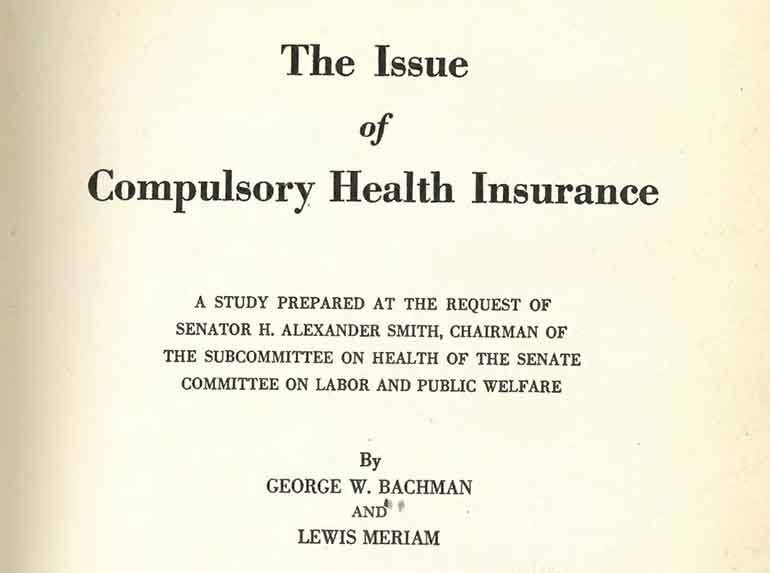
Cover of report on compulsory health
insurance
Brookings
Brookings
1948
A Critical Role in the Marshall Plan
landmark research
At the request of Senator Arthur Vandenberg, chairman of
the Senate Foreign Relations Committee,
Brookings experts play a pivotal role in
the development of the European Recovery Program, later
known as the Marshall Plan, providing valuable
recommendations on the
program’s administrative organization.

A worker in West Berlin, Germany, 1951. The sign reads,
“Berlin Emergency Program, with Marshall Plan
aid”
National Archives and Records Administration
National Archives and Records Administration
1949
Recommendations on Public Welfare to the Hoover Commission
Brookings experts conduct research that forms the basis of a task force report on public
welfare, prepared for the Commission
on Organization of the Executive Branch of the Government,
also known as the Hoover Commission.
On National Transportation Policy
Brookings scholars Charles Dearing and Wilfred Owen publish “National Transportation Policy,”
recommending the creation of
a new department of transportation headed by a new cabinet
secretary. In the 1950s, Owen continued to write about
the nation’s infrastructure
and transportation inefficiencies.
1950
Pay-As-You-Go Social Security
Brookings scholars Lewis Meriam and Karl Schlotterbeck, in “The Cost and Financing of Social
Security,” weigh in on legislation to change social security programs, arguing for a pay-as-you-go system. They
criticize comparing social security programs to private insurance, and argue that “the situation which the country
now faces thus suggests the wisdom of adopting a social security system that provides suitably for old persons and
others now in need, pays the costs from current revenues, and makes no long-term commitments with respect to future
payments.”
1952
Second Brookings President Named
Economist and educator Robert Calkins becomes the second president of Brookings. Calkins was
formerly director of the General Education
Board, a foundation that promoted educational improvements
in the South, as well as an academic at UC Berkeley and the Columbia University Business School.
His broad experience in philanthropy and public affairs are welcome qualities as the Institution seeks to attract
new researchers and general funding.

Robert Calkins
Brookings
Brookings
1953
Studies on the United Nations
Shortly before his death in 1953, Leo Pasvolsky initiates a series of studies on the United
Nations that looked at the features of the UN system to provide a better public understanding of its capabilities
and limitations. The studies were published after his death under the direction of Robert Hartley, who succeeded
Pasvolsky.
1957
Birth of Executive Education at Brookings
institutional milestone
Brookings President Robert Calkins spearheads a new program
of education for senior government executives. The program
contributes to passage of the Federal Training Act of 1958
that provides across-the-board federal employee training to
improve government productivity. In 1962, the program is
renamed the Advanced Study program, forerunner of today’s
Brookings Executive Education, which continues to offer
courses for federal employees on critical issues, the
policymaking process, and public leadership.
1959
A Hard Look at the National Debt Ceiling
landmark research
In “The National Debt Ceiling: An Experiment in Fiscal Policy,” Brookings’s Marshall Robinson
argues that the debt ceiling had not only failed, but backfired. The study is quoted in congressional debates during
the 1960s, and again in 2013.
1960
A New Home for Brookings
institutional milestone
After the federal government uses eminent domain in 1957 to take over Brookings’s Jackson Place
headquarters, which it has occupied since 1931, the Institution builds a new headquarters on Massachusetts Avenue,
just east of Dupont Circle.

Façade of Brookings’s building on Massachusetts
Avenue
Brookings
Brookings
Smoothing the Transition between Administrations
Ahead of the 1960 presidential election, Brookings scholar Laurin Henry leads the Presidential Transitions project
to help the winning presidential candidate—either John F. Kennedy or Richard M. Nixon—launch his administration
smoothly. The book is followed by a series of confidential issues papers prepared by Brookings experts.
Economic Research in Vietnam
Brookings begins a four-year program with the Ford Foundation and the Government of South
Vietnam to provide assistance in tax policy, fiscal policy, and economic planning to the national government in
Saigon down to provinces and villages.
Advice to the New Space Program
As America’s space program is just getting off the ground,
Brookings experts prepare a report for NASA on “Proposed Studies on the Implications of
Peaceful Space Activities for Human Affairs.” The authors make dozens of recommendations for
additional studies on the social, economic, political, legal, and international implications of the use of space.
The report is submitted to the House Committee on Science and Astronautics of the 87th Congress. It continues to be
known today for its few paragraphs on the implications of a discovery of extraterrestrial life.

Cover of report for NASA, 1960
Brookings
Brookings
1961
India’s “Quiet Crisis”
Brookings scholar John Lewis publishes “The Quiet Crisis in India,” an
in-depth study of India’s rural development. Lewis makes the case
for aid to India and the developing world as a component of
U.S. foreign policy. The work is published in India just
two years later, in the same year as the death of
Jawaharlal Nehru, India’s founding prime minister. Lewis later becomes USAID/India Mission
director.
1963
Economic Integration in Latin America
Brookings Foreign Policy and
Governmental Studies programs, in
conjunction with several Latin American research
organizations, coordinate a program of studies on trade and investment policies in Latin America
that lasts into the early 1980s. The program is said to have strengthened the economics profession in Latin America.
1965
Death of Mrs. Brookings, Key Supporter
Isabel Vallé January Brookings, wife of Robert S.
Brookings, dies on April 7, aged 89, and leaves the
Institution an $8 million bequest. She was a
dedicated supporter of the Brookings
Institution, having also contributed money to build
Brookings’s building on Lafayette Square near the White House.

Isabel Vallé January Brookings
Brookings
Brookings
1966
Brookings Enters the Computer Age
institutional milestone
Brookings establishes the Social Science Computation Center for Research, which offers state-
of-the-art computational research support for scholars, including use of a mainframe computer.
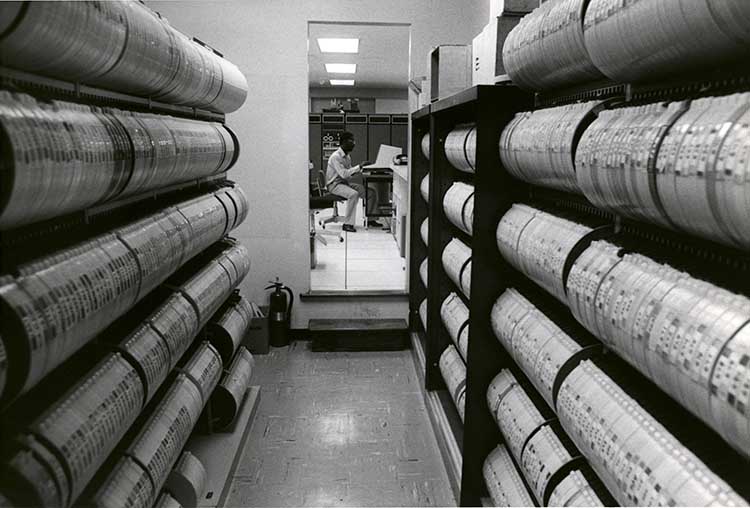
Computer tapes in the Brookings computer
center
Brookings
Brookings
Anniversary Address from LBJ
“You are a national institution, so important to, at least,
the Executive Branch and, I think, the Congress, and the
country,” says President Johnson at an event marking
the Institution’s 50th anniversary, “that if you did
not exist we would have to ask someone
to create you.”

Cover of President Johnson’s fiftieth anniversary
speech to Brookings
Brookings
Brookings
1967
Third President Hails from Budget Bureau
In 1967, Kermit Gordon becomes the third president of
Brookings. Prior to his tenure at Brookings, he served as
the director of the U.S. Bureau of the Budget during the
Kennedy and Johnson administrations.

Kermit Gordon
JFK Presidential Library
JFK Presidential Library
1968
Agenda for the Nation
Brookings publishes the first in a series of “Agenda for the Nation” volumes, which are collections of papers on
domestic and foreign policy issues. In 1970, a pair of reviews appear: one by former Vice President Hubert Humphrey
—then a professor at the University of Minnesota—and another by current Vice President Spiro Agnew. “In ‘Agenda for
the Nation,’” writes Humphrey, “the Brookings Institution has once again been of substantial assistance.” Agnew
writes that the volume’s authors and others “who are assisting the contemporary search for improved governmental
machinery and for a clarification of goals and priorities, must be considered to be an indispensable part of our
governmental process.”
1969
Cold War Defense Analyses
Under the leadership of Kermit Gordon and Foreign Policy Program Director Henry Owen, Brookings
establishes the Defense Analysis Project to study issues such as defense support costs and U.S., NATO, and Soviet
force structures. Work from the project is influential among congressional decision-makers.
1970
Brookings Papers on Economic Activity
landmark research
Brookings scholars Arthur Okun and George Perry introduce the first edition of
the “Brookings Papers on Economic Activity,”
which remains a highly influential and respected economics journal.
1971
Creation of the Congressional Budget Office
Brookings experts begin a new series of studies on the federal budget and congressional spending
choices, which eventually lead to the creation of the Congressional Budget Office; Brookings scholar Alice Rivlin
becomes the founding director of the CBO in 1975.
Setting National Priorities
Brookings releases the first report in the highly acclaimed and influential “Setting National Priorities”
series, a cross-program initiative focused on evaluating annual White House budgets as they are released and
examining the domestic and foreign policy choices that confront the U.S. The report is published annually from 1971
-1983 and then in 1990, 1997, and 1999.
“Blow the safe and get it!”
“Goddamn it, get in and get those files. Blow the safe and get it,” President Richard Nixon says
to aides on June 17, believing that a safe in a Brookings office contains a copy of secret files on the 1968 Vietnam
bombing halt that Nixon believed he could use to blackmail former President Johnson with. The files are not at
Brookings. Legend holds that Brookings security guard Roderick Warren turns away two suspicious men who attempt to
get into the building.
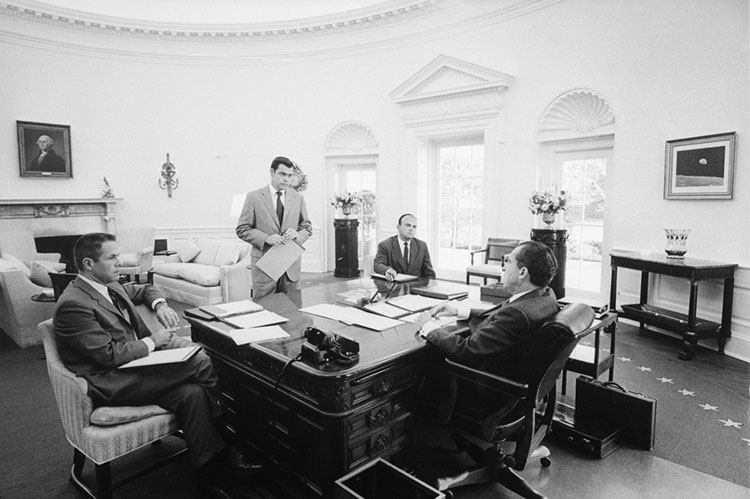
President Nixon meets with chief advisers in the Oval
Office, 1970
National Archives and Records Administration
National Archives and Records Administration
1975
Okun’s “Equality and Efficiency”
Published
landmark research
Brookings publishes Arthur Okun’s “Equality and Efficiency,” a book that
explores “the big tradeoff” between society’s desire to
reduce inequality and the risk of impairing economic
efficiency. The book also examines how redistributing
income affects economic growth.

Arthur Okun in his office at Brookings,
mid-1970s
Brookings
Brookings
Middle East Study Group Recommendations
Following the fourth war between Arab states and Israel in
1973, Brookings releases recommendations of the Middle East
Study Group, a diverse assembly of distinguished Americans
tasked with considering how the U.S. might help in the
achievement of a workable, fair, and enduring settlement to
the Arab-Israeli conflict.
1976
Organizing the Presidency
Brookings scholar Stephen Hess, a former White House staff
member, publishes “Organizing the Presidency.” In it, he
conducts an examination of how various presidents have
organized their offices and staff and sheds light on how
the presidency has become an
institution unto itself.
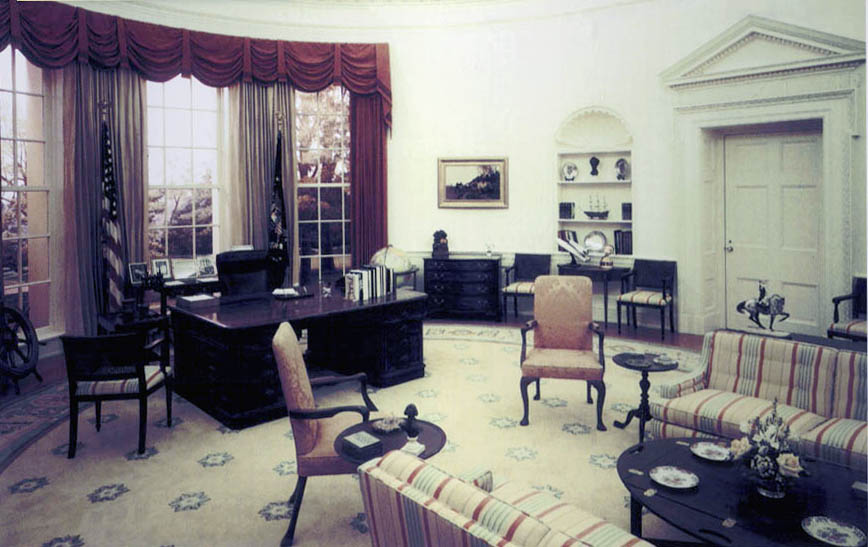
Reproduction of the Oval Office during the presidency
of Gerald Ford, ca. 1975
Wikimedia Commons
Wikimedia Commons
1977
Studies on Soviet Military Power
In 1977 and 1981, Barry Blechman and Stephen Kaplan author books on the Soviet military buildup.
Blechman, then head of the defense analysis staff at Brookings, discusses how the U.S. should respond to Soviet
strengthening of military forces and defense programs. Kaplan, a Brookings research associate, presents case studies
on Soviet use of military power to attain political objectives outside of its borders.
Fourth President Comes to Brookings
The Board of Trustees names Bruce MacLaury the fourth
president of Brookings. Before coming to Brookings,
he served as president of the Federal Reserve
Bank of Minneapolis.

Bruce MacLaury
Brookings
Brookings
1978
Do More on School Desegregation
Brookings researcher Gary Orfield publishes “Must We Bus? Segregated Schools and National
Policy,” in which he argues that American schools have a legal and moral obligation to desegregate. Orfield calls
out school and government officials for intentionally dragging their feet through this process and asserts that more
must be done to achieve the goal of desegregation than simply busing students to different schools. The book
continues to be cited in academic literature.

Children in Charlotte, North Carolina ride a bus together,
1973
Library of Congress
Library of Congress
1979
American Decision-Making in Vietnam
Brookings scholar Leslie Gelb (now president emeritus of the Council on Foreign Relations) and
then-Brookings research associate Richard Betts (later a Harvard and Columbia professor) conclude in a study of
America’s role in Vietnam that while the foreign policy outcome of America’s involvement was a failure, the
decision-making system worked as designed. Yale historian Gaddis Smith wrote that “If an historian were allowed but
one book on the American involvement in Vietnam, this would be it.”
1980
Tracking Vital Stats on Congress
Brookings’s Thomas Mann and AEI’s Norm Ornstein jointly publish
“Vital Statistics on Congress,”
detailing the election and composition of its membership,
party structure, and staff. Mann and Ornstein also document
the growing partisan divide in Congress and track the
demographics of senators and representatives. The book,
updated regularly, is published entirely
online in 2013.

The U.S. Capitol building in Washington, DC,
1980
Library of Congress
Library of Congress
1986
Informing the Tax Reform Act of 1986
landmark research
Brookings initiates a multi-year project on tax
reform led by experts Henry
Aaron and Harvey Galper, under the
supervision of Economic Studies Program Director Joe Pechman. Their research helps inform the
Tax Reform Act of 1986, a major bill that had a profound impact on the U.S. economy. Pechman’s
“Federal Tax Policy”
is essential to those reforms.
1990
New Thinking about School Competition
In “Politics, Markets, and America’s
Schools,” Brookings’s John Chubb and Terry Moe examine the growing
dissatisfaction with the school system in America. They
identify its maladies and propose a new system of public
education constructed around competition among schools,
parent-student choice, and agency
within the system.
1992
Reforming and Renewing Congress
Brookings’s Thomas Mann and AEI’s Norm Ornstein continue
their collaboration, publishing reports from the Renewing
Congress Project, which focuses on ways to improve congressional debate and action on
legislation, enhance relationships between parties, and fix the campaign finance system. Their work makes a
significant contribution to
the debate about congressional reform.
1994
Another View on the Cold War’s End
Raymond Garthoff authors “The Great Transition: American-Soviet
Relations and the End of the Cold War.” His research shows that the U.S. did not win the
Cold War with President Reagan’s military buildup, but instead, “‘victory’ came when a new generation of Soviet
leaders realized how badly their system at home and their policies abroad had failed.”
A Metropolitan Agenda
In 1994, Anthony Downs authors “New Visions for Metropolitan America,”
a discussion of the problem of rapid expansion of cities
and suburban areas. In 1998, Bruce Katz’s “Reviving Cities: Think Metropolitan,”
examines problems caused by explosive urban sprawl and
emphasizes the necessity of a
federal metropolitan agenda. Katz later becomes founding director of the Metropolitan Policy
Program at Brookings.
1995
Brookings Gets Online
institutional milestone
Brookings launches its website, located at the fashionably short URL www.brook.edu, soon after
the debut of widely used web browsers.
Brookings’s Fifth President a Foreign Policy Veteran
Michael Armacost becomes the fifth president of Brookings.
Armacost previously served as undersecretary of state for
political affairs and ambassador to Japan and the
Philippines, and held senior policy positions on the staff
of the National Security Council and in the Departments of
State and Defense.
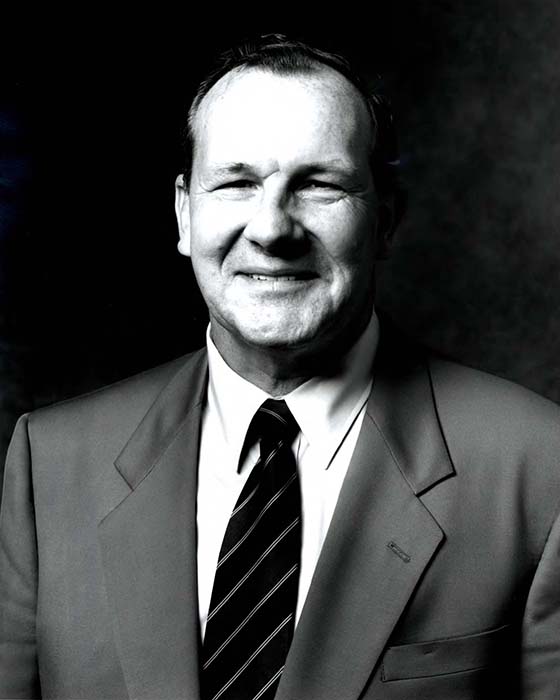
Michael Armacost
Brookings
Brookings
Causes of Yugoslavia’s Breakup
In her book, “Balkan Tragedy: Chaos and Dissolution After
the Cold War,” Brookings scholar Susan Woodward studies the impact of
collapsing state authority and worsening economic
conditions in triggering Yugoslavia’s breakup. The book
presents a challenge to conventional modes of thought and
is released to positive reviews.

A Danish soldier of the UN peacekeeping force, May
1995
Reuters
Reuters
1996
Agent-Based Computer Models
In “Growing Artificial Societies,” Brookings scholars Josh
Epstein and Rob Axtell apply agent-based computer modelling
in their groundbreaking study of human social interactions.
They model an artificial society “from the bottom up” that
can account for evolutionary change.

Screen shot of a computer simulation by Joshua
Epstein
Brookings
Brookings
1998
Crisis of the Internally Displaced
In “Masses in Flight: The Global Crisis of
Internal Displacement,” Brookings’s Francis Deng and Roberta Cohen
analyze the causes and consequences
of internal displacement. The late U.S. diplomat Richard Holbrooke, a former ambassador to the
United Nations, called the book “a landmark study.”
2001
Extending the Child Tax Credit
landmark research
A proposal by Brookings scholar Isabel Sawhill helps forge bi-partisan support in Congress to
extend the benefits of the child tax credit in the Economic Growth and Tax Relief Reconciliation Act of 2001 to
lower- and middle-income families.
Radio/TV Studio Opens for Business
institutional milestone
Brookings’s TV and radio studio opens for business, exactly one week before the 9/11 terrorist
attacks. The first live television feed occurs on the afternoon of 9/11 with CNN.

The Brookings TV studio, later expanded and
upgraded
Brookings
Brookings
Responding with Ideas to 9/11
landmark research
Following the 9/11 terrorist attacks, Brookings experts
produce numerous proposals for homeland security and
intelligence operations, including “Protecting the American Homeland.” They also
testify before Congress and use the Institution’s outreach
capabilities to explain the new global reality to
a frightened public.

The Twin Towers in New York on September 11,
2001
Reuters
Reuters
2002
Sixth President Comes to Brookings
Strobe Talbott, former deputy secretary of
state and ambassador-at-large for the new independent
states of the former Soviet Union, becomes Brookings’s
sixth president. The year Talbott takes over, the
staff numbers just over 270. It exceeds 500 today.

Strobe Talbott
Brookings
Brookings
2003
Public Service Reform Ideas
The second National Commission on the Public Service, led
by former Fed Chair Paul Volcker, releases a set of
recommendations for government reform, “Urgent Business for America.” The
Commission, a project of a Brookings policy center, offers rationales and ideas for reorganizing
the
federal government that stem from the work
of the center.
How to Carry on Government Functions
The Continuity of Government Commission, a joint effort
between Brookings and AEI, issues the first of a set of
reports on how to carry on the functions of government in
the event of a massive and catastrophic attack on the main
institutions of the U.S. government. These reports are:
“The Continuity of Congress” (2003), “The Continuity of the Presidency”
(2009), and “The Continuity of the
Supreme Court” (2011).
2004
Influencing Legislation on Retirement Saving
landmark research
Brookings scholars William Gale, Mark Iwry, and Peter Orszag make
the case that helping Americans save for retirement
requires financial incentives for low- and middle-income
workers coupled with new corporate practices to make saving
easier. Legislation inspired by their work makes them three
of the most-quoted and most-influential economists
in the U.S.
A Program in Metropolitan Policy Is Established
In 2004, the Metropolitan Policy Program is established at
Brookings. Emerging from the Center on Urban and Metropolitan Policy (founded in 1996), it
becomes the Institution’s fourth research program.
Bruce Katz is the program’s founder and Amy Liu is the co-founder.

A view of downtown Kansas City, Missouri, October
2004.
Wikimedia Commons
Wikimedia Commons
2006
Brookings Expands Overseas
institutional milestone
Brookings opens its first overseas offices, one in Beijing,
China and another in Doha, Qatar. A third overseas center,
Brookings India, opens in New Delhi in 2013.

Exterior of the Brookings Doha Center, in
Qatar
Brookings
Brookings
Fifth Research Program, on Global Economics
and Development
The Global Economy and Development program is
officially established as the fifth Brookings research
program. The program originated in the Global Poverty
Reduction Initiative, founded three years before. Lael
Brainard is the program’s first vice
president and director. She later serves as undersecretary of the Treasury for International
Affairs and a Federal Reserve governor.
2007
The Iraq “Surge”
Brookings scholars provide analysis and recommendations throughout the Iraq War. Three scholars
—Michael O’Hanlon, William Quant, and Shibley Telhami—participate in the bi-partisan Iraq Study Group in 2006, which
recommends an increase in U.S. combat troops in Iraq that occurs in 2007.
2009
President Obama Addresses Brookings
President Barack Obama chooses Brookings as
the venue for announcing, in December 2009, his plan
for creating jobs and spurring economic growth.

President Barack Obama at Brookings
Sharon Farmer/sfphotoworks
Sharon Farmer/sfphotoworks
Bending the Health Care Cost Curve
The Engelberg Center for Health Care Reform’s report, “
Bending the Curve: Effective steps to
address long-term healthcare spending growth,” is
widely credited as being the most constructive contribution
to the conversation on addressing long-term growth in
health care spending.

Medical records in a doctor’s office
Reuters
Reuters
The Carbon Pricing Idea
Brookings scholars Warwick McKibbin, Adele Morris, and Peter Wilcoxen recommend how carbon price
agreements can strengthen international emissions targets.
Recovery from the Great Recession
Brookings experts shape the debate on how best to recover
from the Great Recession with a steady stream of analysis
and recommendations on fiscal and monetary stimulus plans,
as well as the automotive and banking bailouts.
2010
Fragile States and National Security
In 2010, Susan Rice, Brookings expert and former U.S.
Ambassador to the United Nations, serves as an editor for
the book “Confronting Poverty: Weak States and U.S.
National Security.” The book highlights how the effects
of poverty in fragile states can spill over borders and
threaten U.S. national security. Rice becomes National
Security Advisor in 2013.
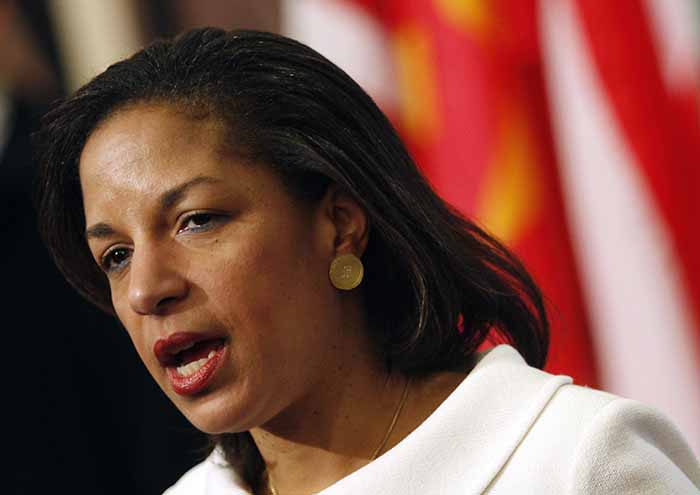
Susan Rice becomes UN ambassador, January
2009
Reuters
Reuters
2011
Fixing Presidential Appointments
landmark research
In 2010, E.J. Dionne, Jr. and Bill Galston convene a bipartisan working
group of experts to address problems and solutions with the
broken presidential appointments process. Their efforts and
report, “A Half-Empty Government Can’t Govern,” inform
Senate passage of the Presidential Appointment Efficiency
and Streamlining Act of 2011, which becomes law in 2011.
2012
Leading the Field of Happiness Economics
Brookings scholar Carol Graham, a leader in the field of
“happiness economics,” authors, “Happiness around the
World: The Paradox of Happy Peasants and Miserable
Millionaires,” in which she studies happiness across
developed and developing countries.

Carol Graham
Brookings
Brookings
Attention to Global Cities
Brookings launches the Global Cities Initiative—a joint project of Brookings and JPMorgan Chase—a
five-year project that aims to help leaders in U.S. metropolitan areas reorient their economies toward greater
engagement in world markets. The Initiative continues to build an international network of metropolitan leaders who
are committed to strengthening competitiveness.
2013
Input on Sustainable Development Goals
landmark research
Brookings experts provide formative input on the
development of the next generation of the United Nations’
Millennium Development Goals, contributing to their mission
to improve the lives of people worldwide. Expert Homi Kharas is appointed lead author and
executive secretary for the UN High Level Panel of Eminent
Persons on the Post-2015 Development Agenda, whose report
provides a road map for the future of
global development efforts.
Longform Debuts at Brookings
The Institution launches The Brookings Essay series, a collection of
commissioned longform works on major topics of public
policy. The pieces are authored by distinguished authors,
including Brookings experts.
Brookings Opens New Delhi Center
In recognition of India’s growing importance on the world
stage, as the world’s largest democracy and a rapidly
growing economic center, the Brookings India
center opens in New Delhi. Organized and staffed in
large part by Indian nationals, it serves as a platform for relevant
and productive research centered on India’s changing role
in the world.
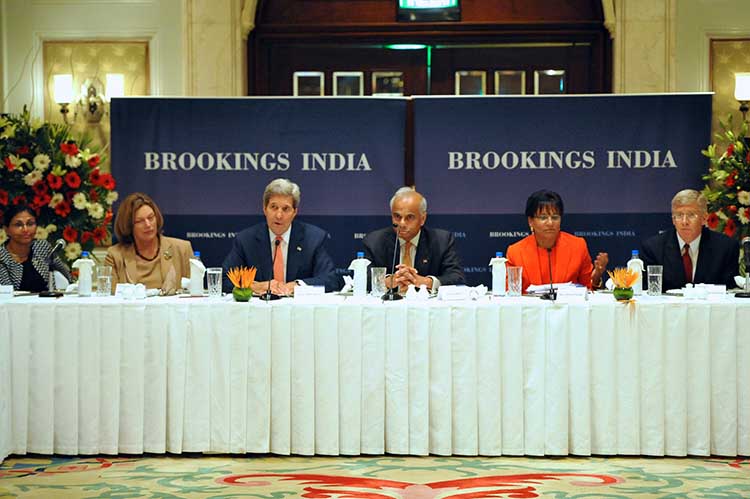
U.S. Secretary of State John Kerry speaks at a
Brookings India event in New Delhi, July
2014
U.S. State Department
U.S. State Department
2015
Let Girls Learn
landmark research
The Center for Universal Education at Brookings joins the Let Girls Learn Initiative, which is championed by First Lady
Michelle Obama. The center has for a long time been at the forefront of research on best practices and tools for
educating girls worldwide.
A New Retirement Security Vehicle
In his State of the Union address, President Obama promotes the Automatic IRA to increase workers’
retirement security. The idea originated in research by the Retirement Security Project at Brookings.
2016
Brookings’s Second Century Begins
institutional milestone
The original and enduring mission of the Brookings Institution is to improve governance. As
Brookings celebrates its 100th year and begins its second century, it is leveraging the breadth and depth of
expertise of its scholars through interdisciplinary approaches to complicated, multi-faceted problems. As
traditional political, economic, and security systems change and, in many cases, weaken in response to shifting
circumstances and innovation, Brookings will work with the public and private sectors, as well as civil society, to
help policy keep pace with a changing world.

Brookings
Research and writing by Fred Dews, Carisa Nietsche, and Cory Scarola
Research support from Sarah Chilton
Editing assistance from Jessica Brandt
Graphics and design by Jessica K Pavone and Cameron Zotter
Web development by Marcia Underwood
Research support from Sarah Chilton
Editing assistance from Jessica Brandt
Graphics and design by Jessica K Pavone and Cameron Zotter
Web development by Marcia Underwood